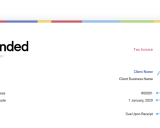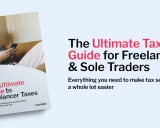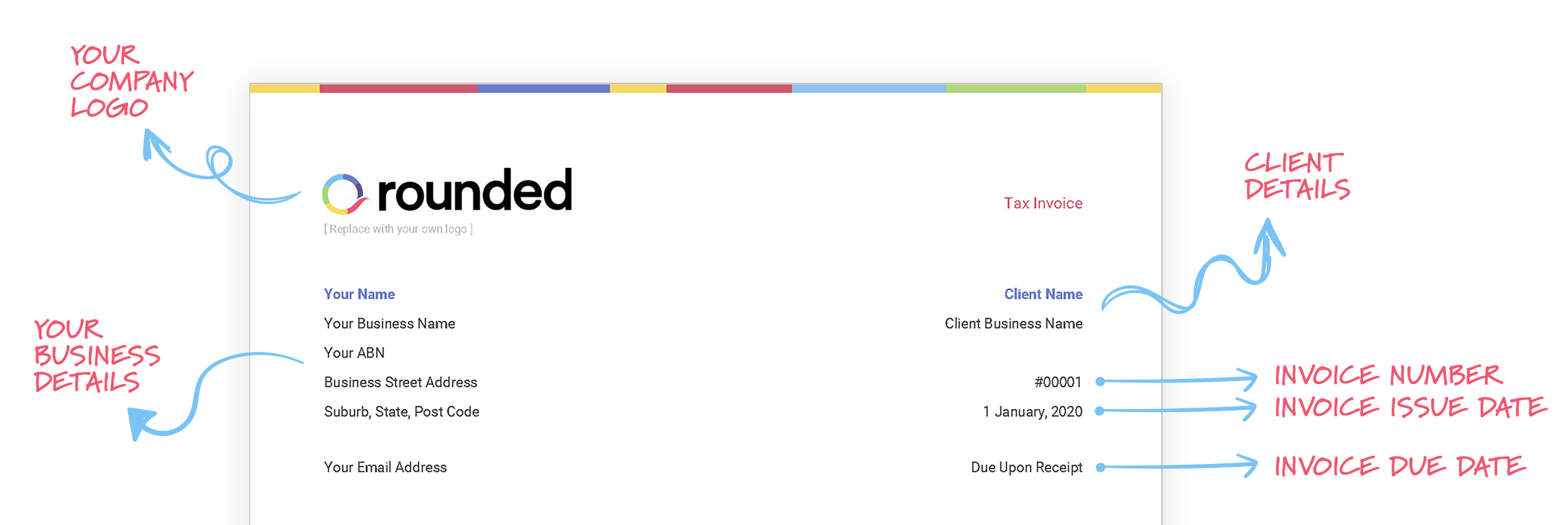
7 foundations for a successful solo business
Business Manager and Mentor Steph Gobraiel takes us through the foundations you need to build a thriving, long-term business.
Article contents
− +.jpg)
In our Customer Spotlight series, we're interviewing experienced freelancers in the Rounded community to share their stories and the lessons they've learned.
This month, we caught up with Steph Gobraiel, owner of S38 Business Management.
Steph is an international bestselling author, meetup leader, and business manager dedicated to helping service-based business owners take control and free up more time in their week.
Whether you need a trusted adviser, an idea sounding board, an operations planner, an executive assistant or a big-picture thinker to help take your business to the next level, Steph is the one to call.
In this article, she walks us through:
The seven foundations for a successful solo business
How you can build these foundations
Making time for business development
Let's dive in!
Steph's journey as a solo business owner
Steph spent 15 years as a personal and executive assistant in the corporate world. Things changed in 2018 when she gave birth to her daughter.
I couldn't work 10-12 hour days and be a mum. That's when I decided to give that up and start my own business—which, funnily enough, ended up being like a second child.
Steph has helped business owners with strategy, planning, and day-to-day operations for the last five years. She especially likes working with fellow parents:
I love supporting parents in business because I know how hard it is and how many balls you have to juggle: your business, your kids, the home, a partner if you have one. Not everyone has a team behind them, and it can be very tough to do all this alone.
Steph has co-authored two books on balancing life as a parent and business owner—one of which has become an international bestseller—and has recently been the finalist for several awards:
2023 AusMumpreneur - Professional Service Business of the Year
2023 and 2024 Australian Women's Small Business Champion
2023 Australian Ladies In Business Initiative Awards - Online Business of the Year
The 7 foundations for a successful solo business
The essential foundations for any business owner, according to Steph, include:
Branding
Services
Website
Marketing
Networking
Business profile
Systems and processes
All seven aspects boil down to one thing: sales.
In this day and age, no one buys from you if they don't know, like, and trust you. Some people will say that's old school, but it's so true because of the world we live in today.
With technology, anyone can start a business. Anyone can say they're a business owner. By building those foundations, you're building your credibility, visibility, and brand name.
Steph emphasises that building these foundations is a long-term process. While it may not win you a client next week, you'll likely see an increase in leads a few months later.
I always say Rome wasn't built in a day. What you do now for one foundation might pay off in six or twelve months, but there are no overnight wins. Whatever you do, it's a long game. And that's okay because people are watching. When they're ready, they'll buy from you.
Branding
Branding comes down to one question: what do you believe in?
For example, I'm big on family first, and that's one of my values in business. I love to support any small business owner, but mainly family-run companies.
I had a client who loved working with not-for-profits because it was her way of giving back, and I had another client who loved working with corporates. As soon as you see their branding and style, you immediately know who they work with.
When helping her clients with this foundation, Steph focuses on two aspects:
Who is your target audience?
What are you passionate about?
For those who might struggle to narrow it down, Steph has some recommendations:
See what other businesses are doing in a similar sphere. I don't mean copying, but see who they're serving, what values they focus on, and how their overall branding reflects these. Dr Google knows everything, so research and spend time on it. You'll find what you're looking for.
Services
Steph emphasises the importance of limiting the number of services you offer:
If someone's looking at your website but doesn't know what they need, they're going to be paralysed if they see too many options. I tell my clients to keep it to 4-6 at most.
This also ensures that you spend more time on enjoyable work, another key element of establishing a solid services foundation.
I've encountered this with a lot of clients. People tend to have services they don't particularly enjoy doing, and it often shows in their work. It's important to understand what you want to offer—you don't have to do it all just for the sake of having it there.
If there are services you don't like that are essential for your work, focus on promoting the ones you do enjoy first.
If someone talks to you about one of your other services, you can offer to help them. But this way, most of your enquiries won't be for work you won't enjoy.
Website
Optimising your website is one of the most important foundations, as it is often your client's first impression of your business.
But, according to Steph, many business owners are making a critical mistake:
A website needs to be an evolving thing, but I see a lot of business owners just set and forget it. That's the worst thing you can do because, straight after social media, potential clients will look for your website.
People have short attention spans now. We're talking seconds. If they can't find what they need on your site, if there are broken links or the navigation is too hard, they will leave and find someone else.
Another problem Steph sees is business owners who are stuck in the cycle of trying to make their site 'perfect.'
There's no such thing as perfect. You've just got to hit go and then make amendments. A website needs to evolve, just like your business itself.
Steph recommends checking in on your website at least once a month to ensure everything's working, especially links to your social media and contact page. You can also use this chance to add new content, such as updated testimonials.
Even better, get a friend or another business owner to look at your site because they'll know what they'll be looking for. Find out what their first impression is and whether it matches what you want clients to experience.
Learn how to make an awesome freelance website (examples included).
Marketing
Regularly producing quality content to promote yourself can be challenging. How does Steph find the time to do it while running her business and helping clients do the same?
Choose your marketing engine—your blog, a podcast, any interviews you do—and let it drive the rest of your marketing. You can get four or six pieces of content from that alone, which, if if you're doing 12 posts a month, is half of what you need.
As for the other half, look to your content pillars—the core themes or topics you want to cover, which usually relate to your values, services, and unique selling points.
For example, highlight networking events you're attending, new services you provide, how an existing service solves a problem for your ideal client, and behind-the-scenes of running your business.
Steph suggests planning ahead to reduce overwhelm. For example, she outlines her content calendar six months in advance and creates and schedules content the month before.
It removes that worry of 'What am I going to do this month?' and it doesn't take long. You'd be surprised at what you can come up with, and if you need, you can use AI to give you a push. You can easily get six blogs, and that's all you need for six months.
Networking
Ultimately, networking is all about finding the ideal space.
If you're in the wrong room, it will never feel right, and it doesn't create a good energy for you or your business. I always tell clients to try lots of different rooms and see how they feel.
To determine if a space is right for you, give yourself 3-6 months.
As Steph says, We need to put a measure on it—otherwise, business owners, especially extroverts, will network until the sun goes down. If we put some measures around it, we can see whether it is a good use of your time or if it's just not the right room to be in.
At the end of your chosen time frame, ask yourself:
Have you made some good referral partners?
Have you gotten a client from being in this space?
What are the outcomes you've achieved?
If you can't find a group that suits you, you can create one, as Steph did with her Business Brunch Networking Group.
There was nothing at lunchtime around here, and I thought, 'Surely there are other people in this world who want to network and have a meal together at lunch, not at the beginning or the end of the day.' I've had 20-40 business owners attend, so sometimes it does come back to you starting your own and building that brand.
Business Profile
Building your business profile is about establishing credibility and helping people get to know you.
There are lots of different ways to do this, depending on your level of comfort and preferences:
Getting a professional photo shoot for your website and socials
Appearing on a podcast or starting your own
Writing an article or guest blog
Speaking at conferences, summits, or business events
Entering business awards
There's no right or wrong approach, so choose what feels right for you and your business.
Another easy way to get your name out there is to contribute to news articles as an expert source. SourceBottle is a free resource you can use to quickly connect with journalists looking for a quote from someone in your industry or on a topic you're knowledgeable about.
For those who might be nervous to put themselves out there, Steph has a few words of advice:
When you look at other businesses online, you don't see all the work it took to get to that point, the baby steps. You can start small. It doesn't have to be jumping in the deep end. Over time, you gain confidence as a business owner and build it from there.
Awards
Steph recommends using Google or asking your network to find suitable awards for your business.
If you Google' awards in Australia', you'll get a whole list of awards you can apply for. The most common ones that come to mind are the Australian Small Business Championship Awards. They have a women's, a local business, one for pretty much every category. Those awards have been around for over 20 years and are very reputable.
When it comes to smaller awards you haven't heard of before, you'll want to do a bit more digging:
Anyone can start an award for businesses, and we've got to be careful about what we're throwing our hat into because we don't want to crush our reputation by getting involved in something that might be a little bit sketchy.
Systems and Processes
While every business is different, Steph recommends a few basics.
You need a system that allows you to see what you need to be doing for your clients and your business. It might look different for every business owner, and there is no one-size-fits-all solution, but it helps to have at least some project management tool.
There are other things, like Rounded for your accounting software. I'm not running a multimillion-dollar business where I need to use MYOB or Xero. Rounded does the job and does it really well.
Steph takes this same approach when it comes to looking at other software:
Why spend $500 a month when you could be doing the same thing and spending less? You have to be smart about it or speak to someone who knows how to do it.
But ultimately, the most important thing is finding a system you want to use.
If you're not using it, we're defeating the purpose. I've found this with my clients: someone has set up a system for them, but they don't know how to use it, and they don't enjoy using it, so it just sits there. It's important to pick a system you enjoy using that works for you and your business.
Do you have clear business processes in place?
Before you can implement your systems, you need clarity around your processes.
Steph recommends the following exercise for those who might need a better understanding of how they work:
Use Word or another speech-to-text tool to discuss what you do for each business area. That will be a great starting point; if you don't have a process in place, you can work on building one.
You don't have to do it all at once—there's too much there. Even if it's one process each week or fortnight, it will add up quite quickly. But you need your processes before you can implement your systems. I always say processes are like the bread, and then systems are the butter that goes on top.
Steph's #1 tip for solo business owners

Ultimately, if you want to set yourself up for long-term success, you need to treat your business with the same level of respect you have for clients.
We make time for clients and respect that time, so why don't we do the same for our businesses? If we treated our own business the same way we treated our clients, we would achieve so much.
Steph suggests identifying the quietest day of the week and blocking it in your calendar. This ensures no one can book meetings during that time and that you have a specific, dedicated slot to focus on building these foundations.
We sometimes feel this obligation to our clients that makes us think we can't stop and do something for ourselves. But many sole traders need to remember that this is why we got into business: to dictate how things work, not vice versa. It has to be a two-way street with clients; if it's a one-way street, that's a red flag for me.
Steph also stresses the importance of looking outside of your business:
Have personal goals, not just business goals. Sole traders are our business, so if we're unable to function properly, how will we be able to run our business or be parents or partners?
This is still a work in progress for me, but it's so important because when we get on the hamster wheel of life, it's so easy to forget ourselves.
Want help building your business foundations?
Book a coffee chat with Steph today.
You can also reach out to Steph via her website or social media:
Website: https://s38businessmanagement.com.au/
Instagram: https://www.instagram.com/steph_gobraiel.obm/
LinkedIn: https://www.linkedin.com/in/steph-gobraiel/
Thanks again to Steph for sharing her advice with us!
Want to be featured in our next Customer Spotlight? Apply here.
Join newsletter
ABOUT ROUNDED
Invoicing and accounting software for sole traders. Get paid faster and relax at tax time.



























